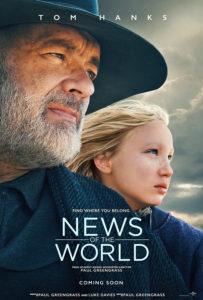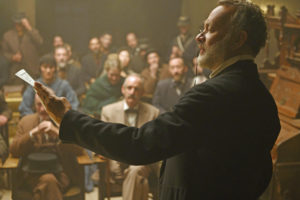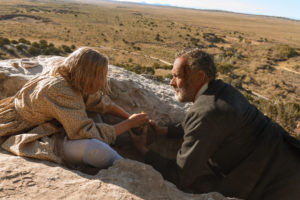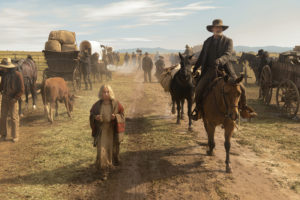 By Steve Crum
By Steve Crum
Unless one wrongly counts his voiceover as the Sheriff Woody doll in the Toy Story series, Tom Hanks has neither made nor starred in a western movie. Until now. Until News of the World, a tender and heartfelt Texas-set tale that showcases yet another solid Oscar worthy performance from Hanks. It is a stunning turn due to Hanks’ underplayed, character driven demeanor.
Directed and co-written by Paul Greengrass (United 93, Captain Phillips), the film is based upon Paulette Jiles’ novel, News of the World. Regarding the movie, what an absorbing 118 minutes.
Hanks portrays Captain Jefferson Kyle Kidd (yes, he’s Captain Kidd), a widowed Civil War vet who makes his living traveling by horseback from town to town in Texas, delivering the news to paying folks who are starved of such. The date is 1870, when few towns even have their own newspapers. That includes Wichita Falls, where the story opens. Kidd carries a dozen or so national newspapers of recent publication that he has perused and organized in a sort of “best of” order. But he does not merely read headlines and leads to stories. Instead, Kidd summarizes the most sensational (like a Pennsylvania mining cave-in) or humorous, and presents them as either funny stories with punchlines or human dramas with payoff conclusions. He is essentially a storyteller, and he is masterful—judging from his enthralled listeners who hang on every word and react with laughter, cheers, and applause. What an incredibly unique way to make a living. It turns out to be pure theatrics via truths: Walter Cronkite with a Shakespearean twist. Kidd’s style is impeccable.

Incidentally, his performance occurs inside a cozy building—not outside on a medicine wagon or the like.
On the road to yet another town, the rather sullen Kidd comes upon the ghastly site of a hanged man near an overturned buckboard. Crouching in fear not far away is a blonde, 10 year-old girl in buckskins, Johanna Leonberger (Helena Zengel, in an impressive performance). She only speaks the Kiowa language because she has lived with them for years—after they killed her parents.
It is here the story shapes, as the two travel en route to Johanna’s aunt and uncle (listed in a document found on her buckboard). Along the long route to the other side of Texas, stops are made so Kidd can make his living delivering the “news of the world.” As they become more comfortable with each other, there are violent encounters with various ruffians.

Speaking of ruffians, another stop Kidd and Johanna make is at a populated tent city remotely located on the prairie. What occurs there is a heated discussion regarding what is real news. The camp’s despotic leader publishes his own “news,” and violently rejects stories found in any of Kidd’s newspapers. More than a bit timely, eh?
Encounters involve man vs nature as well as man vs man.
A positive turn occurs when Kidd stops at friend Jane’s boarding house to visit. Mare Winningham’s Jane is welcoming to both the girl and old friend Captain Kidd. And she speaks the Kiowa language. But the sequence is brief, as the two travelers soon move on.

No spoiler here, but the film’s conclusion packs an emotional wallop.
Throughout, the message of love, trust and compassion prevail. James Newton Howard’s score complements the rich flavor of the late 1800s Panhandle, complete with banjo and orchestra.
Like the news presented by Kidd, News of the World grabs us with irony, drama, and humor—revered qualities anytime, but especially during today’s challenges.
∞∞∞∞∞
GRADE on an A-F Scale: A
